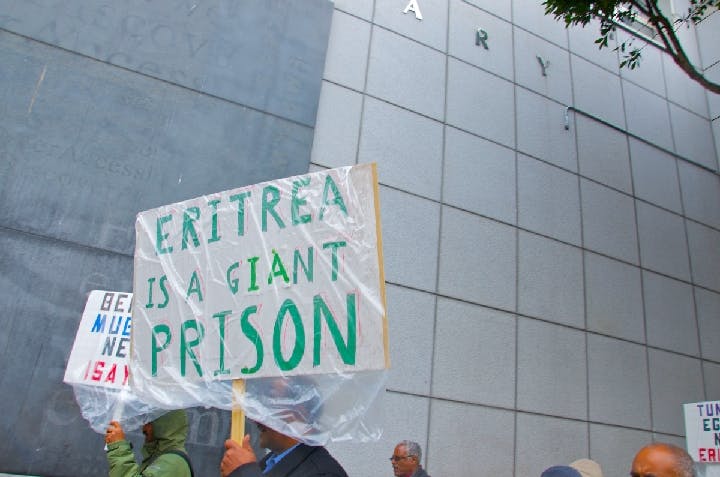The unintended consequences of the EU’s aid to Eritrea
– Isabel Larroca
In an attempt to halt mass migration, the EU is failing to address serious human rights violations.
As the number of people displaced by war has reached the highest level ever recorded, Europe has seen a related rise in inbound migration. According to Frontex, 153,000 migrants were detected at Europe’s external borders between January and May of this year, a 149% compared to the same period in 2014. The largest migrant group is Syrians fleeing the civil war that has ravaged their country for half a decade.
After the Syrians, Europe’s next largest group of immigrants hail not from a wartorn nation — far from it; they come from Eritrea, a country that has recently reduced infant mortality, improved maternal health and worked to combat diseases like HIV and malaria. And yet, according to the U.N. refugee agency, approximately 35,000 of its citizens arrived in Europe in 2014, a 206 percent increase from 2013.
Why are Eritreans fleeing their country when their government has seemingly been working towards improving their quality of life? A senior European Union official blames social and economic exclusion. In an attempt to help “tackle poverty and create jobs” in Eritrea and combat the sudden spike in migration, the EU is reportedly planning to provide aid to Eritrea. While an EU spokesperson told Quartz that the exact amount is still being discussed, an early report described the aid package as €312 million over the course of five years.
Despite the kindly gesture, the evidence that unemployment and poverty are the driving forces behind Eritrean migration is slim, according to Quartz writer Alex Cocotas and Foreign Policy assistant editor Elias Groll. Human rights organizations, reports from the United Nations and Amnesty International, and the accounts of Eritrean migrants all point to an alternative explanation: a repressive government that frequently uses violence to intimidate and coerce its citizens.
Pulling from the UN report from the Commission of Inquiry on Human Rights in Eritrea published on June 8 to detail conditions in the country, Groll describes the situation as a “modern-day police state” and “veritable house of horrors.” In Eritrea, journalists critical of the government have been arrested and imprisoned, and religious institutions are prohibited from “preaching against government policies” or “discussing or expressing an opinion on the policies and actions of the government.” Even the basic movement of people within the country is subject to restrictions, ranging from onerous requirements of special travel documents to the establishment of what the UN report describes as “ubiquitous check points.” According to Groll, this system is in place to catch those who may have skirted the country’s mandatory military service. Conscripted Eritreans can have their period of service extended indefinitely, and are often used for free labor. Soldiers’ wages are so low that they cannot cover basic needs, making Eritrea’s service requirement, a “state-run slavery system,” writes Cocotas.
Those caught criticizing the government or trying to escape the country are frequently subjected to inhumane prison conditions, described in Cocotas’ article as consisting of “pitch-dark underground cells or “metal shipping containers,” where “prisoners die from exhaustion, malnourishment, or lack of treatment for diseases.”
Torture is also common. In a 2013 report, Amnesty International quoted multiple previous detainees about the various torture methods employed in Eritrean prisons.
“I had to walk barefoot for approximately 2 kilometres. It was horrible. The heat blurred my brain. I couldn’t stop walking; if I had, my feet would have burned. When someone began to sway, they hit him. My feet were swollen and blistered.” - former detainee
“The guy was tied in the helicopter [position] – ankles and wrists tied together behind your back with your stomach on the ground. The blood was pouring from his nose and mouth. The prisoners tried to give him first aid. Another officer ordered him untied.… The man died on the way to the clinic.” - former detainee
“When you’re arrested because you try to escape the country the punishment is very hard. They beat me so badly, with plastic and wooden sticks, that I couldn’t move my body for ten days.” - former detainee
To some extent, Europe seems to have acknowledged the human rights crisis in Eritrea — 88 percent of Eritrean applicants were granted asylum by European nations last year. Nevertheless, the EU has yet to show any intention to retract its aid to the Eritrean government. An EU spokesperson told Quartz that the increase in aid will help the European community to engage with the Eritrean government, creating “the possibility of dialogue through which we can … insist on the importance of adhering to international standards on human rights.” While well-intentioned, this explanation lacks basis in past experience: the EU provided aid to Eritrea in 2008, yet the human rights situation since then seems to have only gotten worse.
At best, the EU is misinterpreting Eritreans’ reasons for leaving their country, and consequently addressing the wrong problem. In that gaping wound, mistrust of Europe festers. Eritrean human rights activists Meron Estefanos and Selam Kidane believe that there is a possibility that the boost in aid is part of an implicit agreement with the Eritrean government to tighten its border controls.
Regardless of its rationale, the EU’s response to Eritrean migration overlooks its root cause. By misreading what drives mass flight to European shores, the EU risks failure in both addressing the dangers faced by migrants back home and alleviating the pressure on the countries currently serving as their refuge. In the end, the EU’s one success may end up being only in making the lives of Eritrean citizens much, much worse.
* * *
The Source: Alex Cocotas, “The EU wants to pay off a brutal dictatorship to help it solve its African refugee problem” Quartz July 7, 2015.
Elias Groll, “North Korea on the Red Sea: Why Thousands of Migrants are Fleeing Eritrea” Foreign Policy June 8, 2015.
Photo courtesy of Flickr/Steve Rhodes
